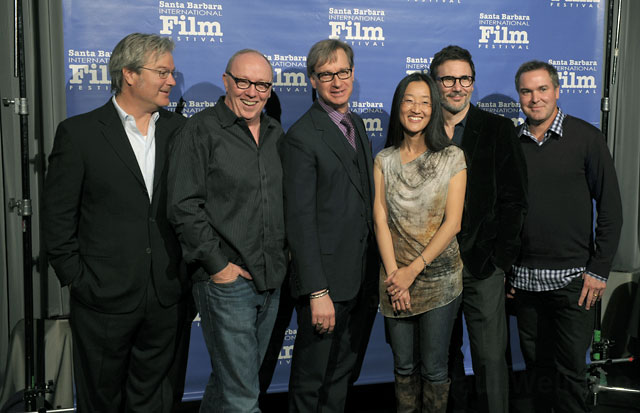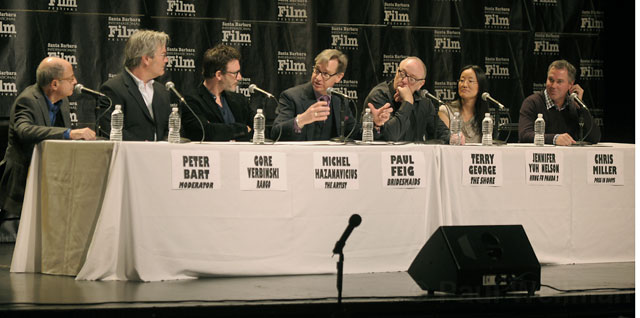SBIFF 2012 Director’s Panel
The Agonies and Ecstasies of Directing in Today’s World

It was not what you would call a big name event.
After all, three of the directors, Jennifer Yuh Nelson, Chris Miller, and Gore Verbinski were repping animated films, which might be moneymakers but are frequently not invited to the adult’s table even at the Oscars. Culty director Paul (Freaks and Geeks) Feig directed a comedy better known for its diarrhea scenes than redeeming social value, and director Terry George made an Academy short entitled The Shore, which he proudly proclaimed “a movie nobody saw.” And though French auteur Michel Hazavanicius (The Artist) might be newsworthy now, his credentials would’ve drawn blank looks even in the biz 12 months ago.
Moderator Peter Bart is likely more familiar than most of the director’s on the panel and, even though he wrote Harold and Maude, the former film exec isn’t exactly a household name either. Yet the talent represented was more boldly interesting than many a year past, reflecting the variety of cinematic experience, rather than Oscars earned or People Magazine ink — it felt like a heartfelt tribute to the offbeat, the unsung heroes.
Take Gore Verbinski, for instance. Known as critically acclaimed blockbuster-ready director of the Pirates of the Caribbean franchise, which earned Disney pirate booty riches; yet Verbinski’s true quality lies in his artistry. His quirky early and late films like Mouse Hunt and Rango exude gutsy innovation. Late in the panel, though, he confessed fear. “Every movie I make, I feel like it’s going to be the last.” And yet, he’s made it clear in both thought and practice that flexibility is his trump card. “I won’t repeat a genre,” he said. When Bart reminded him that Rango and Lone Ranger, which he’s slated to do next, are both Westerns, Verbinski reminded him of the difference between cartoons and live action. “This has gravity and obeys laws of physics,” said Verbinski, who loves returning only to the unknown, he said. “This is the greatest job in the world, if you are always getting an education.”

The other big moneymaker, believe it or not is Jennifer Yuh Nelson, whose Kung Fu Panda films, almost unnecessarily beautiful, also earned megabucks. Bart informed the crowd of her ledger account. “Never has any other movie directed by a woman earned such big box office,” he said. Shyly acknowledging her financial accomplishment, Yuh Nelson seemed more avid to discuss the joys and impossibilities of directing feature length cartoons. Since, she reminded us, animated films takes at least three years, there is always a dark moment halfway through when the director must reassure everybody that everything is going great, “even though you have nothing you can show anyone.” This dark night of the soul must become art. “Being a director is a terrible job. Everything that goes bad is your fault, and if everything is good, someone else can take credit.”
As expected, most of technical questions went to Hazavanicius, who Hollywood currently reveres for playing against all studio expectations for taking a stoner at film school idea — dude, let’s make a silent film — and then actually doing it. He noted that The Artist wasn’t essentially different than his earlier spy spoof films, though, films that did not garner many fans. “I’m making period pieces, and in each of them I’ve done my best at recreating the shooting process that was used. I tried to respect the cinematic grammar of the period.”
The conversation livened while discussing the difference between words and film, with Feig, a believer in multiple takes — who joked that Kodak reps would show up with champagne when he was working — offering the opening salvo. “The worst thing you can do is just shoot the scrip,” though admitting the need for a substantial screenplay. Chris (Puss in Boots) Miller claimed he was able to do improv in animation, which veteran TV, and film Terry George replied, “I’d like to hear more about that.”
Later, in response to audience questions, the whole panel weighed in on the impossibility of the job. One audience questioner asked what it was like to see the work after it was done, could directors objectively enjoy films years later, maybe. God no, was the group answer. Always you would be haunted by the imperfections. “If anything, it’s getting worst and worst over time,” said Hazanicuius in charmingly bad English. “Watching old films is like, well, it’s a Gatling gun of pain,” added Yuh Nelson.
Verbinski agreed as George, Feig, Miller, and Hazavanicius nodded heartily. “A Gatling gun of pain,” he echoed.



